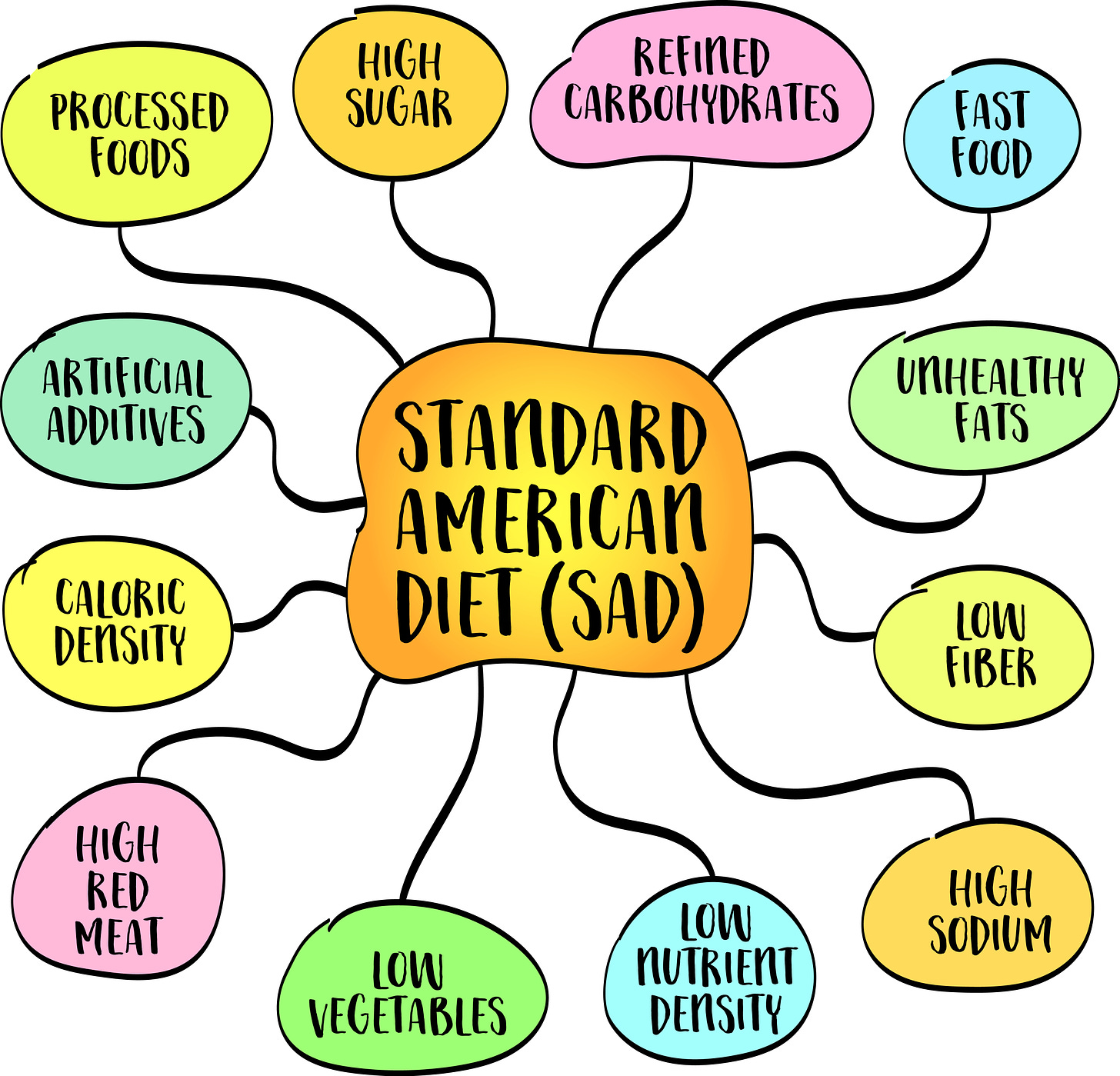
The Standard American Diet (SAD) is marked by an excessive intake of processed foods, red meat, sugars, and saturated fats. Processed foods often contain high levels of additives, preservatives, and unhealthy fats, contributing to numerous health issues. Red meat, frequently consumed in large quantities, is linked to increased risks of heart disease and certain cancers. Sugars, ubiquitous in many American diets, lead to obesity, diabetes, and metabolic disorders. Saturated fats, prevalent in many animal-based and processed foods, further exacerbate these health risks.
‘‘The Standard American Diet (SAD), known for its high intake of processed foods, red meat, sugars, and saturated fats, has serious health and environmental impacts. SAD's nutritional shortcomings, ethical issues, and ecological consequences highlight the benefits of adopting a plant-based diet as a healthier, more sustainable, and ethical alternative.’’
From a vegan perspective, the repercussions of SAD extend beyond individual health concerns to broader environmental impacts. The production and consumption patterns associated with SAD are not only detrimental to personal health but also pose significant environmental challenges. The high demand for meat and dairy products drives deforestation, water pollution, and substantial greenhouse gas emissions, which contribute to climate change.
This article drills into the myriad consequences of SAD by examining its nutritional shortcomings, ethical dilemmas, and ecological ramifications. By highlighting these issues, the article underscores the importance of considering alternative dietary patterns. Specifically, it promotes a plant-based diet as a viable and beneficial alternative. Such a diet is not only more sustainable and ethical but also supports better health outcomes. The shift towards plant-based eating is presented as a solution that addresses the interconnected problems of personal health, animal welfare, and environmental sustainability.
The Nutritional Shortcomings of the Standard American Diet
The typical nutritional profile of SAD is alarming. It is high in calories, deficient in fiber, and overly reliant on processed foods. This dietary pattern is linked to prevalent health issues such as obesity, type 2 diabetes, heart disease, and certain types of cancer. In contrast, a balanced vegan diet, rich in whole, plant-based foods, offers superior nutritional density. Whole grains, fruits, vegetables, nuts, and legumes provide essential nutrients without the excess calories and harmful fats found in SAD.
Environmental Impact
The environmental consequences of SAD are equally troubling. Meat and dairy production are major contributors to deforestation, water pollution, and greenhouse gas emissions. Animal agriculture is resource-intensive, requiring significant land use, water consumption, and energy compared to plant-based food production. A vegan diet presents a more sustainable alternative, with studies showing significantly reduced environmental footprints for plant-based diets. Transitioning to a vegan diet can help mitigate climate change and conserve precious resources.
Ethical Considerations
Ethical issues associated with SAD primarily revolve around the treatment of animals in factory farming. The moral implications of dietary choices are stark, with veganism advocating for minimizing animal suffering and exploitation. By choosing a vegan diet, individuals can reduce the demand for factory-farmed animal products, challenging the norms of animal cruelty and promoting a more compassionate world.
The Superior Moral and Ethical Nature of Veganism vs. Carnism
Carnism is the ideology that supports the consumption of animal products, while veganism opposes animal exploitation. Veganism embodies a more compassionate and ethical lifestyle, respecting the intrinsic value of all sentient beings. Carnism often involves moral inconsistencies, such as cognitive dissonance in caring for pets while consuming other animals. Veganism, on the other hand, promotes justice, empathy, and non-violence, aligning dietary choices with ethical principles.
Health Benefits of a Vegan Diet
Adopting a vegan diet offers numerous health benefits. These include lower blood pressure, improved cholesterol levels, and better heart health. A vegan diet can also aid in weight management and reduce the risk of chronic diseases. Scientific studies and health organizations support the health advantages of plant-based eating, highlighting its potential to enhance overall well-being.
Barriers to Changing Diets and How to Overcome Them
Transitioning from SAD to a vegan diet can be challenging due to cultural norms, taste preferences, and convenience. However, practical tips can help overcome these obstacles. Gradually adopting a plant-based diet, finding plant-based alternatives, meal planning, and seeking community support are effective strategies. The increasing availability and diversity of vegan products in mainstream markets also make the transition easier.
Conclusion
The adverse effects of the Standard American Diet are clear, from health issues to environmental degradation and ethical concerns. A vegan diet offers a compelling alternative, providing numerous benefits for health, the environment, and animal welfare. Readers are encouraged to consider making dietary changes for a healthier, more sustainable, and ethical lifestyle. Explore more about vegan diets and start incorporating more plant-based foods into your meals.
Further Resources
For those interested in learning more about veganism, here are some valuable resources:
Books:
"How Not to Die" by Dr. Michael Greger
"The China Study" by T. Colin Campbell
Documentaries:
Websites:
Organizations:
Get my new booklet ‘‘25 Vegan Myths Debunked!’’
This concise guide is invaluable for anyone curious about veganism, offering evidence-based insights and practical guidance to navigate vegan living confidently. All proceeds benefit the promotion of animal rights worldwide!
Visit Our Amazon Store!
Notice: As an Amazon Associate, we earn a commission from qualifying purchases that help promote animal rights worldwide!
General Resources
Books:
Dominion: The Power of Animals in Nature and in Our Imagination by Matthew Scully
Animal Liberation by Peter Singer
Eating Animals by Jonathan Safran Foer
A Billion Hungry Mouths: Feeding the World Without Consuming the Planet by Colin Tudge
Websites and organizations:
Documentaries:
Articles:
"The Case for Animal Rights" by Tom Regan
‘‘Why We Love Dogs, Eat Pigs, and Wear Cows: An Introduction to Carnism’’ by Melanie Joy
‘‘Animal Rights: The Abolitionist Approach’’ by Gary L. Francione
‘‘Fellow Creatures: Our Obligations to the Other Animals’’ by Christine Korsgaard
Seeds of Compassion: Finding Jesus Christ in a Vegan World by Michael Corthell
Receive a single informative article daily at 12:01 AM by email. Explore my homepage with exciting vegan and plant-based news content and delightful and delicious recipes for additional updates. Stay connected to the vegan world and all it has to offer.
Visit The Vegan Project Global our Facebook page for more vegan outreach and education.
Also, visit our new YouTube channel
The information on this vegan/plant-based blog is for general informational purposes only. It is not intended as legal, medical, or professional advice. Readers should consult with appropriate professionals for specific advice tailored to their situation. The blog owner is not responsible for any reliance on the information herein.





